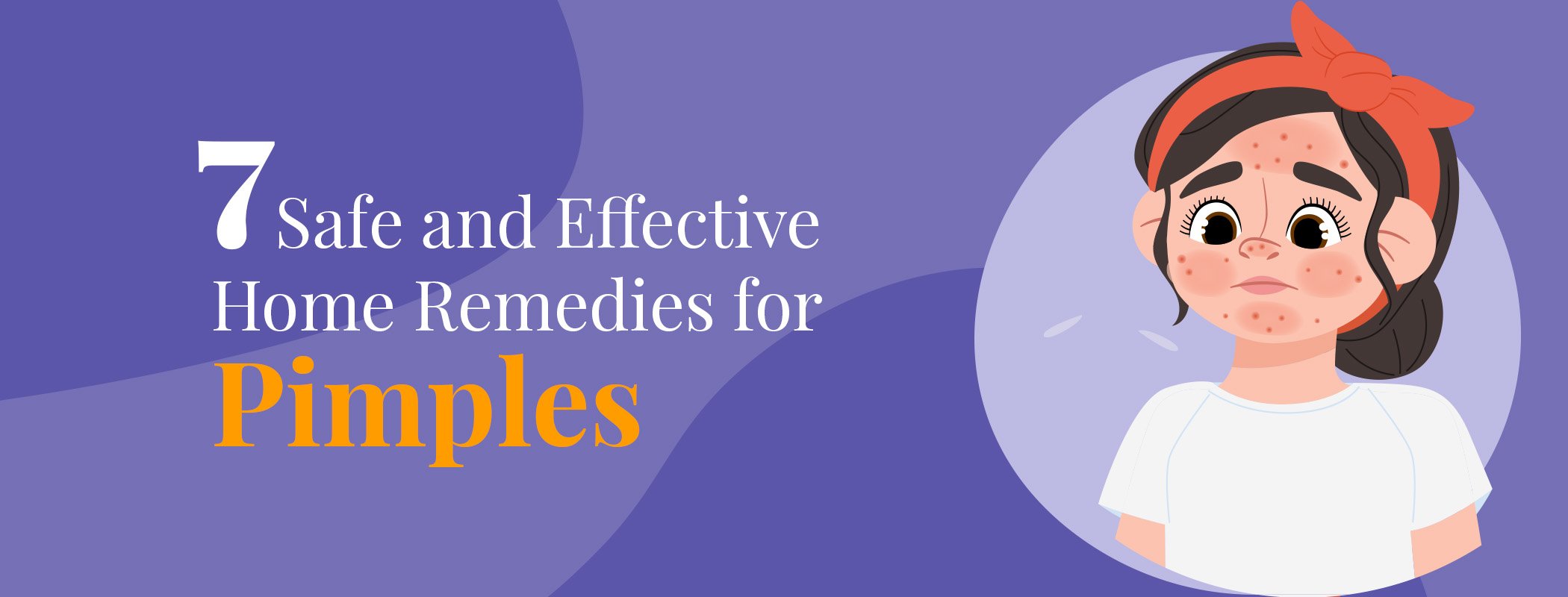How to cure pimples?
May 26, 2023

What is a Pimple?
A pimple is a skin condition characterised by the inflammation of the hair follicles and sebaceous glands. It typically appears as a raised red bump with a white or yellow centre called a pustule. Pimples commonly occur on the face, neck, chest, shoulders, and back.
Causes of Pimples
Several factors contribute to the development of pimples:
- Excess sebum production: Increased oil production by the sebaceous glands can clog hair follicles, leading to pimples.
- Bacterial growth: Propionibacterium acnes, a type of bacteria that naturally resides on the skin, can multiply and cause inflammation in clogged follicles.
- Hormonal changes: Fluctuations in hormone levels, especially during puberty, menstruation, or hormonal disorders, can trigger the overproduction of sebum and contribute to pimple formation.
- Diet: Certain foods, such as high-glycemic index carbohydrates and dairy products, may exacerbate pimples in some individuals.
- Stress: High-stress levels can stimulate the release of hormones that increase oil production and contribute to pimple development.
Symptoms of Pimples
The most common symptoms of pimples include:
- Redness and inflammation around the affected area.
- Formation of whiteheads or blackheads (comedones).
- Pus-filled lesions or pustules.
- Pain or tenderness upon touching the pimple.
- Formation of cysts (large, deep, and painful pimples).
Home Remedies for Pimples
- Cleanse the affected area twice daily with a gentle cleanser:
- Use a mild cleanser suitable for your skin type to wash your face gently.
- Avoid scrubbing aggressively, as it can irritate the skin and worsen pimples.
- Pat your skin dry with a clean towel instead of rubbing.
- Apply tea tree oil directly to the pimple:
- Dilute tea tree oil with a carrier oil like coconut or jojoba oil.
- Use a clean cotton swab to apply the diluted tea tree oil to the pimple.
- Tea tree oil’s natural antibacterial properties can reduce inflammation and eliminate acne-causing bacteria.
- Use a spot treatment with benzoyl peroxide:
- Apply a small amount of benzoyl peroxide cream or gel directly on the pimple.
- Benzoyl peroxide helps reduce inflammation, eliminate bacteria, and unclog pores.
- Start with a low concentration (2.5% or 5%) to avoid skin irritation and gradually increase if needed.
-
- Apply a warm compress to the pimple:
- Soak a clean washcloth in warm water and gently place it on the pimple.
- Keep the warm compress on the pimple for a few minutes.
- The warmth increases blood circulation, opens up pores, and aids in the drainage of pus.
- Apply a warm compress to the pimple:
- Incorporate witch hazel into your skincare routine:
- Apply witch hazel to a cotton pad and gently dab it on the pimple.
- Witch hazel acts as a natural astringent, reducing inflammation and minimizing pimple appearance.
- If you have dry or sensitive skin, be cautious as witch hazel may cause additional dryness.
- Apply a small amount of aloe vera gel to the affected area:
- Use clean fingertips or a cotton swab to apply a thin layer of aloe vera gel on the pimple.
- Aloe vera soothes and reduces inflammation while promoting healing.
- Opt for raw, organic aloe vera gel for the best results.
- Stay hydrated by increasing water intake:
- Drink an adequate amount of water throughout the day to keep your skin hydrated.
- Well-hydrated skin is less prone to excessive oil production and clogged pores.
- Aim for at least eight glasses (64 ounces) of water per day.
- Avoid touching or picking at the pimple:
- Refrain from touching, squeezing, or picking at the pimple to prevent introducing bacteria and further inflammation.
- Picking at pimples can lead to scarring and delay the healing process.
- Maintain good hand hygiene and avoid touching your face unnecessarily.
- Use non-comedogenic skincare and makeup products:
- Select skincare and makeup products labeled as “non-comedogenic” or “oil-free.”
- Non-comedogenic products are less likely to clog pores and contribute to pimple formation.
- Check the ingredient list to ensure the products are suitable for acne-prone skin.
- Consume a balanced diet of fruits, vegetables, whole grains, and lean proteins:
- Incorporate a variety of fruits and vegetables rich in antioxidants, such as berries, leafy greens, and carrots.
- Include whole grains like brown rice and quinoa for their fiber content.
- Opt for lean proteins such as chicken, fish, and legumes.
- Limit processed foods, sugary snacks, and high-glycemic index foods, as they may worsen pimples in some individuals.
- Practice stress management techniques:
- Engage in regular exercise to reduce stress and improve overall well-being.
- Practice meditation or deep breathing exercises to calm your mind.
- Ensure you get enough quality sleep to allow your body to rest and regenerate.
- Managing stress helps prevent hormonal imbalances and reduces the likelihood of stress-induced breakouts.
Remember, each person’s skin is unique, so it may require some experimentation to find the most effective home remedies for your pimples. Consistency and patience are key when using these remedies. If your pimples persist, worsen, or cause significant distress, consult a dermatologist or healthcare professional for further evaluation and guidance.
When and Who to Consult
While home remedies can effectively manage pimples, knowing when to seek professional help is essential. Consult a dermatologist or healthcare provider in the following situations:
- Severe acne that does not respond to home treatments.
- Deep, painful cystic acne that is causing scarring.
- Other symptoms, such as fever or body aches, accompany pimples.
- Acne is affecting your self-esteem and emotional well-being.
- If you are still deciding the best course of action or need personalised advice.
Managing and curing pimples requires a holistic approach that includes understanding the causes, recognising the symptoms, and implementing effective home remedies. By adopting a consistent skincare routine, making lifestyle changes, and seeking professional help when necessary, you can effectively control and prevent pimples, ultimately achieving healthier and clearer skin. However, everyone’s skin is unique, so finding the right combination of remedies that work best for you may take time.
People also ask
-
How do I stop pimples on my face?
- Cleanse your face twice daily with a gentle cleanser.
- Avoid touching your face with unwashed hands.
2. How can I clear my skin in 2 days?
Clearing your skin in just two days is not realistic, as it takes time for pimples to heal. However, you can try these steps to improve your skin’s appearance:
- Cleanse your face twice daily with a gentle cleanser.
- Apply a spot treatment containing benzoyl peroxide or salicylic acid to reduce inflammation.
- Avoid picking or popping pimples.
- Keep your skin hydrated and maintain a healthy diet.
3. How do pimples go away?
Pimples typically go away on their own over time. The healing process varies, but you can help them go away faster by:
- Avoiding squeezing or popping pimples to prevent further inflammation and scarring.
- Applying spot treatments with ingredients like benzoyl peroxide or salicylic acid.
- Maintaining a regular skincare routine and keeping your face clean.
- Allowing your skin to heal naturally and being patient.








